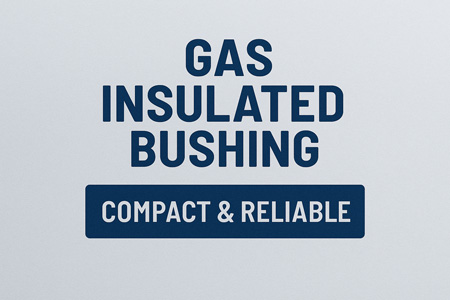As power transmission systems continue to evolve, the demands for space efficiency, operational safety, and long-term reliability are becoming increasingly critical. To meet these requirements, gas insulated bushings (GIBs) have gained widespread acceptance in medium- and high-voltage applications. Their design offers a combination of superior insulation capabilities, a compact and modular form factor, and minimal maintenance needs, making them a smart choice for today’s advanced electrical infrastructure.

Unlike traditional oil-filled or solid-insulated bushings, gas insulated bushings use SF₆ (sulfur hexafluoride) or other suitable insulating gases to provide superior dielectric strength in a sealed environment. This configuration makes them ideal for indoor substations, GIS (Gas Insulated Switchgear), and other space-constrained applications.
·High Dielectric Strength: SF₆ gas offers excellent electrical insulation, enabling bushings to withstand higher voltages without risk of flashover.
·Compact and Lightweight: GIBs require less space compared to traditional porcelain or oil-insulated bushings, making them suitable for modular equipment.
·Hermetically Sealed: The enclosed design minimizes exposure to moisture and contaminants, reducing degradation risks.
·Low Maintenance: No oil leakage, fewer moving parts, and sealed structure translate to longer inspection cycles and reduced O&M costs.
·Fire & Explosion Safety: Absence of flammable insulating oil makes GIBs inherently safer in enclosed environments.
·Gas Insulated Switchgear (GIS)
·Transformers in urban substations
·Renewable energy equipment (wind, solar, offshore)
·Underground and tunnel-based power systems
·Rated Voltage and Current: Ensure compatibility with system requirements
·Partial Discharge Performance: Look for factory-tested units with low PD levels
·Insulating Gas Type: SF₆ remains common, but alternatives like dry air are emerging for environmental considerations
·Mounting & Interface Design: Must match transformer or switchgear configurations
·Standards Compliance: Check for IEC, IEEE certifications and factory routine tests